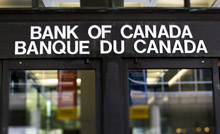
Mark Carney is leaving the Bank of Canada for one of the most storied financial positions in the world — to take over the Bank of England at a pivotal time in its 318-year history.
The announcement shocked observers on both sides of the pond, particularly as Carney had previously played down reports he was being considered, as he also played down rumours about joining the International Monetary Fund and the Liberal Party.
But the Bank of England rumours turned out to have substance, although Carney on Monday said he had not formally applied for the job and only made the decision in the last two weeks.
He insisted he was not leaving Canada in the lurch for the big job, however.
“We have a system that works very well. It’s been tested under the biggest economic and financial shock we’ll ever see in our lifetime and it has passed that test,” he told reporters.
“I’m going to where the challenges are greatest because I’m confident that the strengths are as deep and as broad as they are here in Canada. I could not do it any other way.”
Finance Minister Jim Flaherty called Carney his “friend” and admitted the news was “bittersweet.”
“It is our loss, of course it is. Mark has been a superb governor of the Bank of Canada for more than five years, so his loss will be felt.”
The appointment takes place next July, but Carney will leave the Canadian bank on June 1, about 18 months before his full seven-year term was due to expire.
Appointed Feb. 1, 2008, Carney’s legacy will have been to help steer the Canadian economy through the 2008-09 recession, revamping the management of the institution and introducing what the central bank called the most sophisticated, plastic currency in the world.
But as he admitted, he also inherited a stable financial system and regulatory framework. He appeared to work well with Flaherty, who hand-picked him for the job over more seasoned candidates.
Where he shone was on the world stage, particularly at meetings with his counterparts at the G7 and G20, where his voice appeared to carry more weight than might otherwise be the case coming from a relatively small country like Canada.
Time magazine named him one of the most influential policy-makers in the world and his name began surfacing whenever any big international job came open. Last year, he was given the responsibility of overseeing global financial reforms as head of the Financial Stability Board.
His duties and challenges at the Bank of England dwarf anything Carney faced in Ottawa. Much like in the U.S., the British financial system collapsed in 2008, requiring massive government bailouts.
He also arrives at the Bank of England with more of a free hand than he enjoyed in Canada, or was available to his predecessor, Mervyn King.
The British central bank will continue to set monetary policy, as does the Bank of Canada, but now it is also responsible for overseeing the financial system and regulating banks, and ensuring financial reforms are implemented. Carney will also remain as head of the Swiss-based FSB, overseeing the global system.
Carney said he was “honoured” to have been given such trust.
“This is a major challenge, a major opportunity. It is very important for the global economy that the U.K. does well, that it succeeds in this rebalancing of their economy, that the reform of the British financial system is completed, it’s very important for Canada that the European transition comes to fruition. I will play a role there,” he said.
IHS Global Insight chief U.K. and European economist Howard Archer called the appointment “unprecedented” because Carney was an outsider. But in the end, that may have been Carney’s ace in the hole.
“The appointment of Mr. Carney likely reflects the view that it is a good time to have a complete new broom … and that this is easier to achieve with a complete outsider,” he said.
Carney chose to highlight his connections to England, dating back to the decade he spent in London with Goldman Sachs.
“My wife is a British and Canadian national … I know a lot of people in the City, in the industry in the United Kingdom,” he explained. “Obviously, I think I can play a constructive role in relaunching this institution with its new responsibilities.”
With Carney’s departure, senior deputy governor Tiff Macklem, who Carney recruited from the Finance Department much as he had been earlier, becomes the front-runner to succeed him in June.